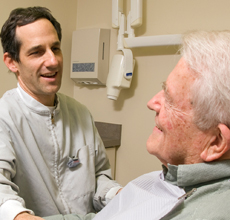Something to smile about
Kevin Hendler works with a few tools in his hands, and a few tricks up his sleeve.
 When Kevin Hendler entered the field in 1987, geriatric dentistry was not even a recognized specialty. Although geriatric dental specialists are still rare, today a national organization brings them together. Hendler is a current fellow and past president of the American Society of Geriatric Dentistry and president-elect of the Special Care Dentistry Association. |
He's a specialist in geriatric dentistry—one of the few in the country.
Hendler's practice is far from traditional dentistry. "Open your mouth, please" doesn't always work with his patients. Some are medically compromised, taking blood thinners or a pillbox full of medications. Some have Parkinson's or other movement disorders, compromising their ability to keep their mouths still and open. Others have dementia and are unable to understand what the dentist is asking them to do.
That's where the tricks come in. Distraction is one. Hendler can talk a blue streak about nothing in particular, but the babble calms patients, he says. And while they are distracted, he works fast. For those with movement disorders or cognitive impairment, sometimes medication can help them relax. Ideal textbook situations are often lacking, so Hendler develops a modified treatment plan for the task at hand. It keeps the work interesting, he says.
He staffs the Ina T. Allen Dental Center at Emory's Wesley Woods Center. The center handles around 2,500 patient visits a year. Services extend from routine teeth cleanings and fillings to fittings for partial and complete dentures, crowns and bridges, periodontal treatment, and oral surgery. (Hendler also sees inpatients at Wesley Woods Hospital.)
Founded in 1989 by oral surgeon David Allen and his wife Beverly, in memory of his mother Ina Allen, the dental clinic was renovated in 1992 with support from the J.B. Fuqua Foundation. It has four fully equipped, wheelchair-accessible rooms, including one that is accessible by patients on stretchers. There is also a panorex machine for taking x-rays of the upper and lower jaws and a darkroom.
The official age of eligible patients at the clinic is 55, but Hendler rarely looks at biologic age. Sometimes a 92-year-old can be in better shape than someone 30 years younger. Hendler particularly likes working with this patient population. "They are part of the Great Generation that went from barely having cars to the computer age," he says. "They have great stories to tell."
Beyond dental health, Hendler believes dentistry is essential to maintaining good overall health. If older people can maintain good oral hygiene, they will head off a lot of disease. He points to new studies that link periodontal disease to systemic disease. At Emory, researchers are studying whether the bacteria that cause gum disease also produce substances that amplify the effects of a hormone that ramps up blood pressure.
Hendler is spreading his passion for geriatric dentistry by teaching medical residents, geriatric fellows, and physician assistant students. "Students need to understand the relationship between general health and oral health," he says.
Just recently, Hendler recalls an elderly man with dementia who went from cooperative to combative. Although the medical workup revealed no explanation for the change, one care provider decided to send the patient, who wore dentures, to the dental center. Hendler discovered that the man's dentures were cutting into his upper jaw, causing a large ulcer inside his upper lip. Once the dentures were repaired, the patient returned to his calm and docile self.
Tracking down hidden causes and developing tricks that work are signs of success that the Allen Dental Center is working. Another? Hendler holds up all 10 intact fingers. He's only been bitten once, and then, he admits, "It was my own fault." —Rhonda Mullen


